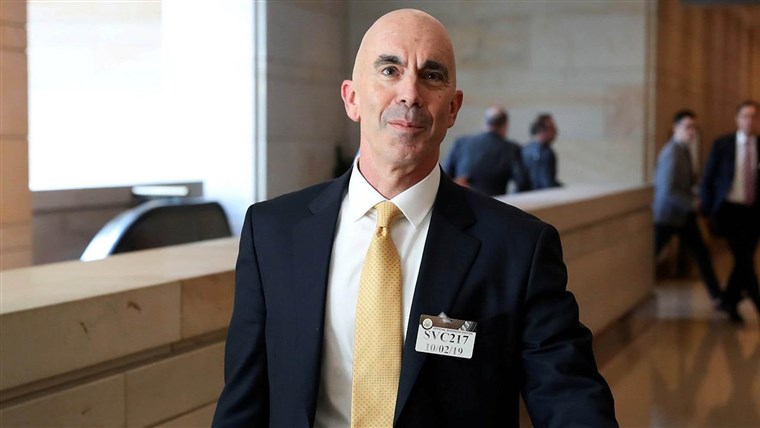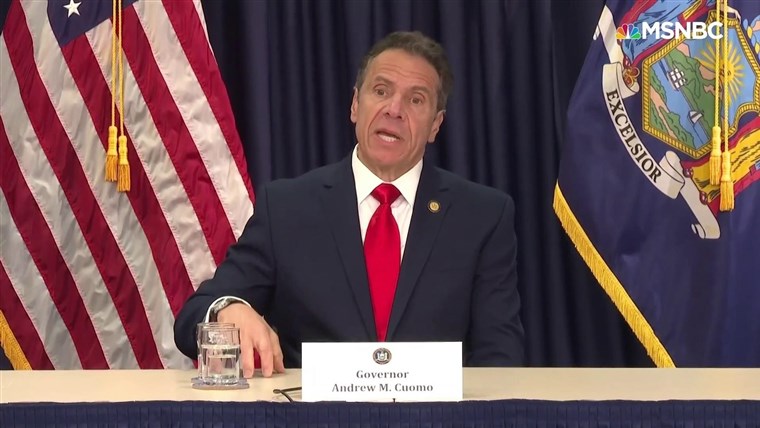Advertisement
President Trump, barring the unforeseen, will be the first American president to face voters after being charged with high crimes and misdemeanors.

WASHINGTON — President Trump sat forward on the edge of his chair and chatted at length with reporters in the Oval Office on Thursday, unbowed but for him a little subdued. The day after he was impeached for high crimes and misdemeanors, he dismissed the judgment of the House of Representatives and punched back by celebrating with a Democratic congressman who switched parties to stand with him.
“I don’t feel like I’m being impeached because it’s a hoax, it’s a setup,” Mr. Trump insisted as he showcased Representative Jeff Van Drew of New Jersey, the newly minted Republican, and looked beyond his seemingly certain acquittal in a Senate trial to next fall’s election.
“I’m beating everybody by a lot,” the president said, “and I think that’s where we’re going.”
For Mr. Trump, it was the first day of his new reality, the first day when he woke up with the scarlet letter of impeachment marked with indelible ink on his page in the history books. No matter what else happens, he now enters posterity as the third president to be impeached.
But barring the unforeseen, he will also be the first impeached president to face re-election, setting up a 320-day campaign to convince voters that he was right and his accusers were wrong. He has a chance that Andrew Johnson and Bill Clinton never had — to mitigate, at least, the sting of impeachment — and his political operation wasted little time mounting a counterassault on what Mr. Trump characterizes as the corrupt, liberal Democrats who orchestrated a largely party-line scheme to nullify his election.
In a fund-raising pitch on Thursday, Brad Parscale, the president’s campaign manager, called the Democrats who voted to impeach him “traitors” and urged supporters to fight back. “Let’s make sure they know that we will NEVER FORGET,” Mr. Parscale wrote. The campaign announced a “Democrats for Trump” coalition of disaffected members of the other party.
Still, some Republicans were less confident that impeachment would be a boon at the ballot box. Corry Bliss, a Republican strategist who oversaw the party’s independent but ultimately unsuccessful effort to defend its House majority in 2018, said there was a long road to Nov. 3.
“The world is going to end 500 times between impeachment and the election,” he said. “We don’t live in a society where anything can last for 10 or 11 months.”
In a blistering editorial on Thursday evening, a prominent evangelical magazine, Christianity Today, called for Mr. Trump to be removed from office. The move was a pointed departure from the vast majority of Mr. Trump’s white evangelical base, which has supported the president through myriad controversies.
“The president of the United States attempted to use his political power to coerce a foreign leader to harass and discredit one of the president’s political opponents,” wrote Mark Galli, the editor in chief. “That is not only a violation of the Constitution; more importantly, it is profoundly immoral.”
But the editorial is unlikely to signal a significant change in Mr. Trump’s steadfast support from white evangelicals, as the magazine has long represented more centrist evangelical thought and popular evangelical leaders continue to support him.
For Mr. Trump, the day after found him still a little shellshocked, according to people close to him. Despite the clear momentum behind impeachment among Democrats in recent weeks, some of Mr. Trump’s advisers tried to convince him — and themselves — that Speaker Nancy Pelosi did not have the votes and might not even bring the articles of impeachment to the floor, despite warnings from the White House director of legislative affairs, Eric Ueland, that the votes were there.
Mr. Trump’s aides packed his schedule with events to keep him out of Washington as the debate took place on Wednesday. He vented his fury at a rally in Michigan that started even as the votes were being recorded. But having gotten his emotions off his chest, he was unusually talkative flying home on Air Force One. Impeachment “doesn’t feel like anything,” he told aides, according to one person briefed on the conversation.
However much the humiliation and the ensuing news coverage stung, Mr. Trump was intent on not showing it — even in private.
By Thursday morning, he was eager for information. He watched television coverage, listening for clues about what Ms. Pelosi might be up to. Almost as soon as she said she might delay sending the articles of impeachment to the Senate, Mr. Trump started surveying advisers about what it could mean. “Why do you think she’s doing that?” he asked one person after another.
The answers varied and advisers assured him they were looking at options, including trying to push through a trial regardless or arguing that he technically was never actually impeached in the first place, according to a person familiar with the discussions.
Ivanka Trump, the president’s eldest daughter, made a point of going on CBS News to make clear that Mr. Trump was undaunted by impeachment. “He’s energized,” she said.
To make sure of that, and to press any advantage against Democrats, Mr. Trump’s aides rushed to put together an event for Thursday with Mr. Van Drew, one of two Democrats to vote against both articles.
Mr. Van Drew, who declared himself a Republican after the votes, was invited to the Oval Office on a day’s notice.
“You have my undying support,” he told the president. “Always.”
Mr. Trump thanked him. “And by the way, same way,” he said. “I’m endorsing him, O.K.?”
No other president has gone on to an election after being impeached. Johnson, who had not been elected in the first place and acceded to the office after Abraham Lincoln’s assassination, was shunted aside after being acquitted in a Senate impeachment trial.
A Democrat who had joined the Republican Lincoln’s ticket as his vice-presidential running mate in 1864, Johnson found himself without a party in 1868. Within weeks of the Senate verdict, both parties nominated other candidates without considering him, and Gen. Ulysses S. Grant went on to win as a Republican.
Johnson later mounted a comeback of sorts when the Tennessee legislature made him a senator back in the days before direct elections, but he died several months after joining the body that had put him on trial.
As for Mr. Clinton, he was in his second term when he was acquitted by the Senate in 1999 and therefore ineligible to run again. His vice president, Al Gore, ended up losing the 2000 election.
For that matter, President Richard M. Nixon was also in his second term when he resigned after the approval of articles of impeachment by the House Judiciary Committee in 1974. His vice president and successor, Gerald R. Ford, ended up losing in 1976.
Mr. Trump resolved to reverse that record, and advisers said they had already detected a surge of support from the president’s base. The Republican National Committee and the Trump campaign said they had raised at least $5 million on Thursday alone and $20.6 million in the past month. About 600,000 new volunteers have signed up since September, the party said.
“It’s absolutely been more unifying than anything I’ve seen in years,” said Dan Eberhart, a Republican donor. “Impeachment is really Chapter 1 for the 2020 race. It’s setting up the battle lines and people are realigning their strategies based on how certain members voted.”
Catalina Lauf, a former Trump administration official who is challenging Representative Lauren Underwood, Democrat of Illinois, said impeachment had fired up even some Democrats in her district. “You might disagree with the man,” she said, “but you also feel the treatment he’s been given since the day he was elected is pure madness.”
That sense of grievance and persecution neatly fits into the message Mr. Trump has conveyed from the start — that the elites are out to get him, that they hate him and that they hate his supporters, the “deplorables,” to use the word once uttered by Hillary Clinton that has become a rallying cry for the president’s team.
John Fredericks, a radio host in Virginia, said the volume of calls into his morning show on Thursday was so inundating that he finally had to stop answering them.
“People are outraged because they know what is really going on is that Pelosi and the Democrats think that they know best,” Mr. Fredericks said. “Their message to us is, ‘You are really stupid people who go to Walmart and smell and can’t be trusted.’ It’s an insult.”
Still, Democrats are energized, too, and may be more so if a Senate trial results in acquittal along party lines. Moreover, Mr. Trump’s backlash strategy did not work as well as he had hoped during last year’s midterm elections when he tried to convert conservatives’ anger over what they considered unfair sexual misconduct allegations against Brett M. Kavanaugh, the president’s Supreme Court nominee, into turnout at the polls.
Arguably, the passion generated by the Kavanaugh hearings helped Republicans in select Senate races, but Democrats went on to capture the House.
John Whitbeck, the Republican Party chairman in Virginia, where Democrats captured the state legislature last month, said that impeachment helped Republicans see the stakes of the 2020 election more clearly. But the longer term political trends, he warned, suggested the party could still fall short.
“If you are a Trump supporter and you didn’t vote in these off-year elections, I just don’t see how you don’t show up,” he said. “But I don’t know if that’s going to be enough to overcome the fervor on the other side.”
In states like Virginia that have trended away from Republicans, Mr. Whitbeck said antipathy toward Mr. Trump has been so overwhelming that his political operation has been unable to account for it accurately in its data.
“We spent a ton of money trying to get Trump voters engaged. We’re doing everything we can to account for the high turnout. And still we’ve underestimated it every year,” he said. “It’s just historic on the other side.”
Peter Baker, Maggie Haberman and Jeremy W. Peters reported from Washington, and Elaina Plott from New York. Nick Corasaniti contributed reporting from New York, and Elizabeth Dias from Washington.


